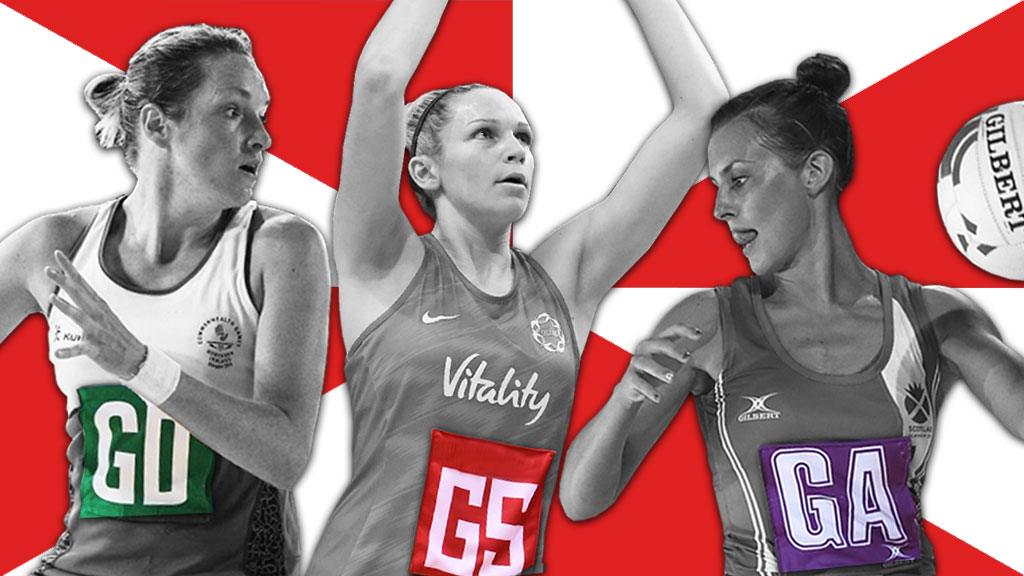Proscovia Peace: Netball has provided meaning to Uganda captain's life
- Published
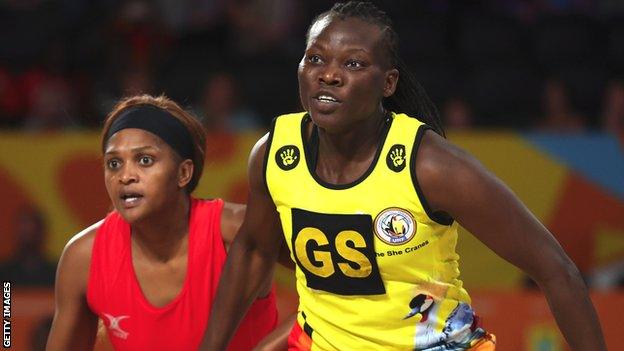
Proscovia Peace helped Uganda finish fifth at this year's Commonwealth Games in Birmingham
From playing barefoot, surviving being poisoned and growing up in a country that discouraged women's sports, netball has helped provide meaning to Proscovia Peace's life.
As the Uganda captain prepares to lead her side in a three-match series against England, she has been reflecting on her journey.
Avoiding teenage pregnancy and marriage, which friends as young as 12 were forced into, were among the early challenges she faced.
"I witnessed it with my own eyes - at that stage I feared for my life - but what made me get through was determination," she told the BBC World Service.
"Even now, teenage pregnancy in Uganda is at the peak. That shows me that most of them can't see any future ahead and they are forced into situations like this."
Peace grew up in the Arua District in north-west Uganda, where playing netball eventually provided her salvation - even if her early years playing the sport were not easy.
"The situations under which we trained were horrible, and we never had a proper netball," the 32-year-old said.
"We made netballs out of shopping bags, and we went into the forest to get sticks to implant as a [goal] post, before tying a rope around it.
"And all this training we were doing, there were no shoes. If you look at my leg you'll see so many scars. Every time people ask why I have so many scars, I tell them every single scar can tell a big story - it is what has made me.
"All this was my struggle in my career, trying to make it to a higher level, because the conditions were not conducive. I learned that situations like that never define who you are. It is how you go through those situations that make who you are.
"Many branched off along the road. I continued, and that's why I am here today."
Poisoned on a bus
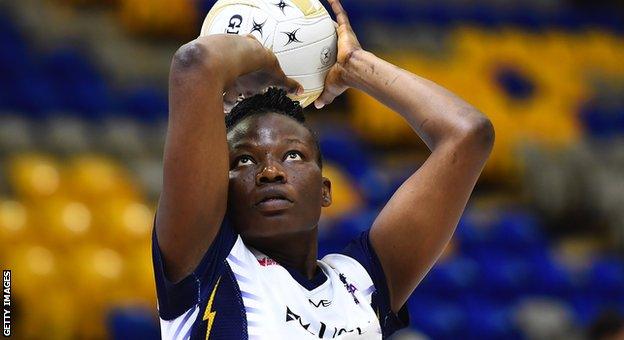
Peace played netball at school and was identified as a talented athlete by a PE teacher, but her father refused to allow her to move to Kampala - Uganda's capital city - to study at university and pursue a netball career.
"Later on, I stopped blaming my father, simply because he never knew the benefit of sport," she said.
"He was born in a broken family, and did not know anything. He wanted the best for his daughter, but he could not afford it.
"There are many families like that, where people don't even have TV or radio to hear anything to do with sports. Plus there was nobody like an icon for us to see.
"It was not until I left that people in my community now know that netball benefits, and that sports can develop somebody."
But she almost never made it when, having left town against her father's wishes, Peace was poisoned on a bus.
"A stranger gave me a piece of sweet, and when somebody gives you something, you accept it," she ventured. "You just think this is a normal traveller. So when I ate it, that was when I started passing blood, and my tummy was aching.
"There are instances like that in the past when somebody would just randomly, maliciously, give somebody poison. A few children have died. I survived. How I made it, I don't know.
"I blacked out because I lost a lot of blood. A friend came to help and got me to hospital, and that's how I survived - through her, not me.
"I believe there was a stronger power that ran to my rescue when I couldn't rescue myself."
'Netball has given me what money would never buy'
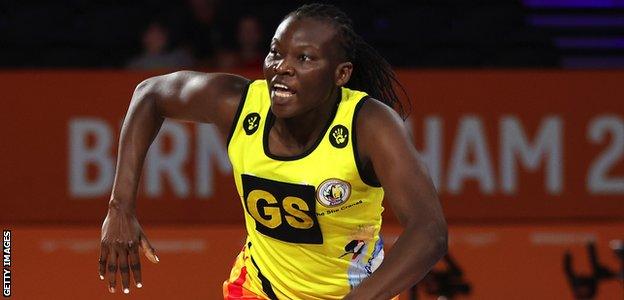
Peace's Uganda have already booked their place at the 2023 Netball World Cup
After recovering, Peace established herself one of the best goal shooters in the world, and became the first African to play in the UK's Super League when she appeared for Loughborough Lightning in 2015.
She has helped Uganda's She Cranes rise to sixth in the world ranking before next year's Netball World Cup in Cape Town, South Africa, and is eager to be a role model for girls across the continent.
"I am humbled to be that person that somebody can look up to," she said.
"I have always strongly believed it's not the trophies that I get, but the impact I have left in the lives of other people that is a legacy.
"Being able to inspire other people is what fulfils my joy, because it's my responsibility to show the way to somebody else and make them a better person.
"Netball has the power to empower somebody. So many people think a sport like netball doesn't benefit [you], but if I count my blessings, netball is number one on it.
"Netball has given me what money would never buy. You may not see it in material forms, but the things that it has done; giving education, making you explore, giving you family, empowering you to be the voice of the voiceless. Those are some of the greatest achievements that money cannot buy."
Reconciliation with her father
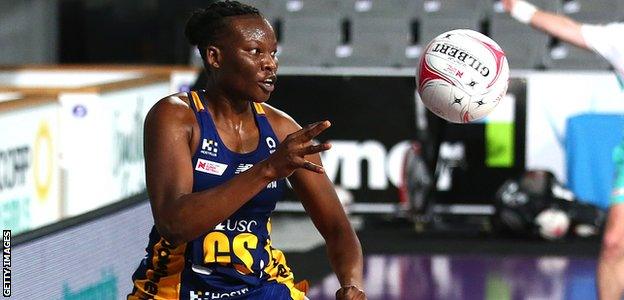
Peace has played for Loughborough Lightning and Surrey Storm in the Netball Super League, and also had stints with Australian clubs
Peace is now on good terms with her father, who she describes as a "beautiful man", and her success in her netball career has allowed her to provide a house for him to live in.
"Getting to know my father's story humbled me," she added.
"He's called recently to tell me 'I don't deserve to get anything from you because of the way you were brought up. But you brushed off everything and built a roof above me'.
"I used the money from netball to build him a house, and to make him sleep under a beautiful roof, and that humbled him the more. That house looks like an icon to everybody in the community that this is what netball can do, and he is grateful for it.
"He keeps telling people 'Every child is a human being; treasure them, respect their decisions, and give them the opportunity to do what they can do'.
"I think everything happens for a reason. I am grateful he is my father. It doesn't matter what happened. He is my father and I forgive him a long time ago.
"I love with him with the whole of my heart, because if he didn't love me he would have dealt with me when I was a child, and I was helpless. But he preserved my life, kept me to this stage, so for that reason I am grateful."

The champion of two courts ignored by the world: Ora Washington fought to make her name in racially segregated America
'We bleed craft beer': Can BrewDog's CEO steer the Good Ship through the storm of controversy?

Related topics
- Published10 July 2019
